
Before I outline the problem, let's lay out some assumptions and facts.
First, there is no doubt that the Hebrew אבן, sometimes written as ן'י, used as part of the name of many Spanish Jews and their descendants is the Arabic word ابن, son of. The usage is equivalent to the Hebrew בן, although it need not always refer to the person's father. It often refers to a grandfather or other ancestor, which is also an accepted, expanded use of בן. Furthermore, in Arabic the word is pronounced ibn, subject to an important qualification. The qualification is that it appears that the Spanish Arabs did not pronounce it ibn, but rather pronounced it aben (please note, incidentally, that the vowel shift here is the same as that between two of the possible pronunciation of the word רבי). The following entry is from E.J. Brill's first encyclopaedia of Islam, 1913-1936, Volume 1:
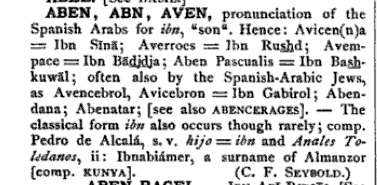
Thus, it would seem likely that Ibn Ezra (and all, or most other Sephardim) pronounced it aben and not ibn, as the current common practice is. My assumption is that the way which Ibn Ezra himself pronounced it should carry some weight, even if it differs from how we pronounce it.
Below is the entry אבן in Elijah Levita's Tishby (Blogger doesn't do nekkudot well):
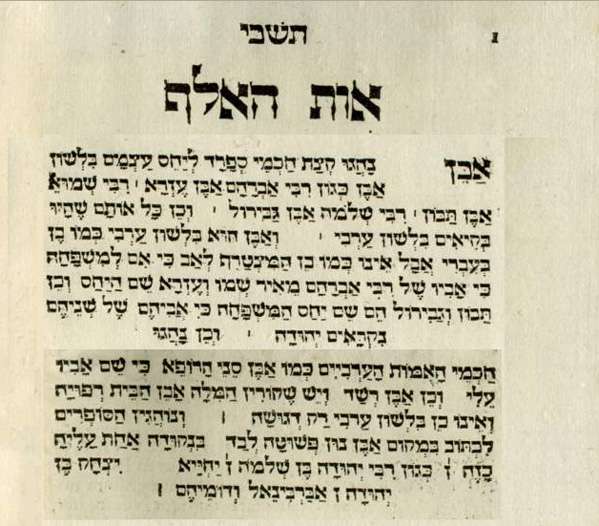
That was from the 1541 Isny edition. Please note that the image is a composite. אבן is actually the second entry, and extends to two separate pages, with Latin translation in the middle. I'll admit that I am unsure why the entry is vocalized with a tsere, while all instances receive a segol in the entry itself. This does not seem to be a mistake, since the book includes a list of corrections by the author at the end and this is not mentioned. In addition, it should be noted that the author was a grammarian whose method is to vocalize according to grammatical principles rather than usage. This can be seen all over his works, where words are vocalized in ways in which we are not used to (mainly because he did not succeed in pressing those vocalizations into common use). In addition, he often criticizes conventional vocalizations for being grammatically impossible. For example, he roundly rejects the vocalization of רבי with a sheva under the resh and a dagesh in the beis as impossible. This vocalization was common in manuscripts, see below. He assigns, rather, a chirik under the resh as correct. His observation was seconded by Rabbi Jacob Emden two centuries later, however his solution was to retain the sheva, but change the beis to give up it's dagesh.
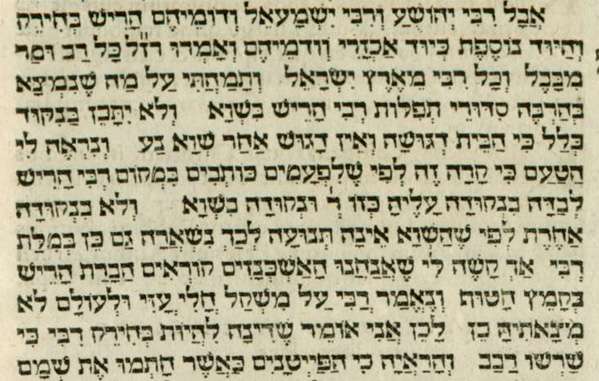
Below is a beautiful late 13th century manuscript (from the Kauffmann collection, ms 388a) which vocalizes רבי in exactly the way that Levita and Emden realized were (grammatically) impossible:
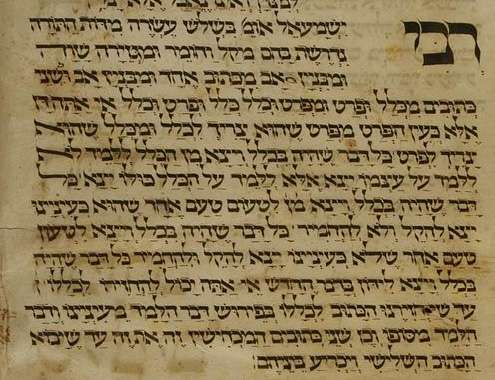
Here is how Rabbi Emden discusses the vocalization:
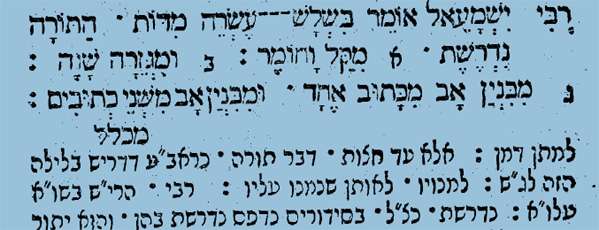
While I'll admit that for some reason it looks like the ב has a dagesh (and I can't explain it, unless it's a typographical error or the result of a bad scan), elsewhere Emden reveals more:
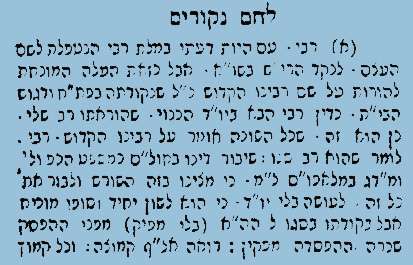
This is from his comment on the first Mishna of the second chapter of Avos. As you can see, he reiterates his contention that the resh receives a sheva, however he also comments on the proper vocalization of רבי as the title for Rabbi Yehuda Ha-nassi. In his opinion this word is different from conventional occurrences of the word, for it does not mean "rabbi" the same as the conventional title, but is more personal, meaning "My master [rabbi]." Thus, rather than point it with a sheva it receives a patach (ra-). More importantly, he spells out that the ב has a dagesh. I believe I am not incorrect in inferring that according to him in the conventional occurrence the ב does not have a dagesh. This would be the same grammatical error that R. Elijah Levita corrected. Indeed, in later printings of Rabbi Emden's siddur the ב has no dagesh, and there is a parenthetical insertion affirming this after R. Emden's original comment. Whether this is proper without clearly stipulating that it's an addition by a later editor is a perfectly fair question.
But we hardly need to make pilpulim like the one I just made. On page יט of his Luach Eresh (letter נ) he says it explicitly:

And here is how his predecessor Rabbi Solomon Hanau points it in his Siddur Beis Tefillah, a truly wild solution, although arguably not any more wild than what is, essentially, "Rivi", being that both are unprecedented:
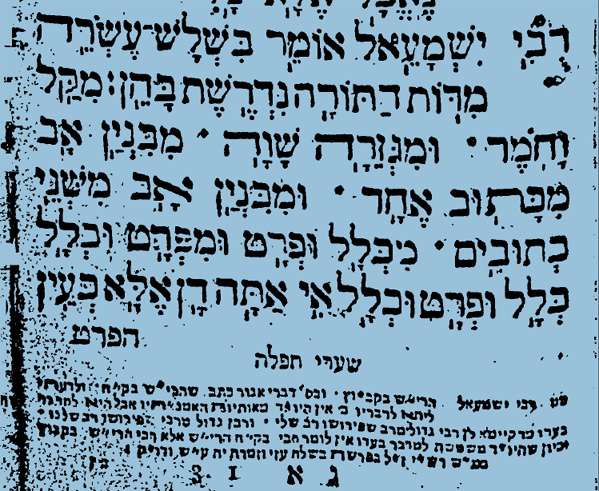
To add another wrinkle, below is a comment in Johann Reuchlin's De Arte Cabbalistica (1517):
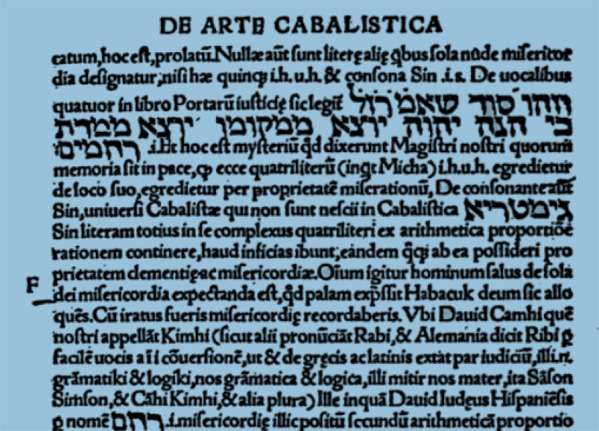
" . . . On this, David Kamchi -- Or Kimchi, in our pronunciation (like the way some say rabbi, and the Germans say ribbi because it's easier; and like the divergence of opinion of Greek and Latin on grammatiki and grammatica, and logiki and logica, mitir and mater, and so too Samson and Simson, Kamchi and Kimchi, and so on) -- anyway, this Jew, David, a Spaniard, teaches . . . "
Amazingly, he writes that the Germans say ribi. This seemingly contradicts the testimony of R. Elijah Levita, who lived at the same time. However, it's possible that i was Reuchlin's closest equivalent of how the Germans pronounced chataph qomatz, which is itself interesting. Of course one would like to know how Germans pronounced the Latin i in the early 16th century!
Since this post is ostensibly about ibn and not rabbi, getting back to Levita's entry for אבן we can also see his tendency to vocalize according to grammatical rules from the way he vocalized Tibbon and Gabirol. In both cases he conformed with Hebrew grammar and omitted the dagesh, although in Arabic (and these names are Arabic) they would receive a dagesh. I can't say much about his decision to vocalize what we call Tibbon as Ta[bb]on, because I am not certain if he did it for Hebrew grammatical or another reason. I will say that Tabbon seem to conform to the shift we see in Aben, which seems to be the Spanish Arabic pronunciation. My purpose in noting that his vocalizations would seem to be motivated more by grammatical correctness than by usage is to demonstrate that there needs to be some suspicion, or at least caution, on his value as a witness.
However, he is far from the only witness to the pronunciation of the Arabic ابن written in Hebrew as אבן as Aben. Essentially it is always written so in European languages until well into the 19th century.
Below are some samples:
Sebastian Muenster, 1527:
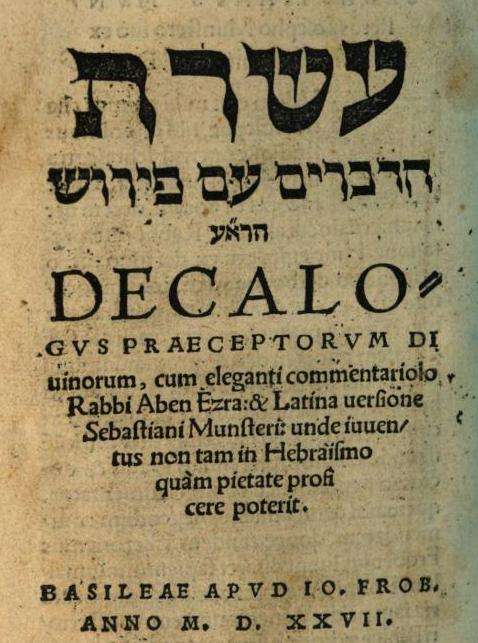
Buxtorf, 1613:

A very typical example from 1723:
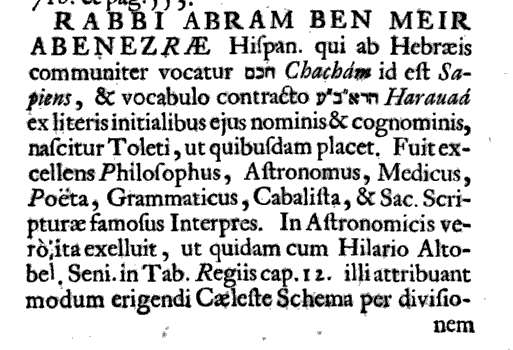
In fact as near as I can tell "Ibn Ezra" simply does not make an appearance until the 1820s. It is surely possible that there are some stray examples before then -- I have found a couple of "abn"s:

But apart for that possibility, it seems certain that the 1820s was when "aben" began to give way to "ibn." Why "ibn" was never used before the 1820s, and became about equally used as "aben" in the rest of the 19th century, and to be almost totally preferred in the 20th is an interesting question. Tentatively one assumes it has to do with increased exposure to modern Arabs in the Levant. In fact, here is how it is written in the German edition of Jehoseph Schwarz's Das heilige Land (1832):

This in addition to many other citations of Arab names with "ibn." Old habits die hard, and look how Isaac Leeser writes it in two separate places in his 1850 translation of Schwarz, "The Holy Land":


What is clear is that "ibn" was on the ascent as being scientifically more correct, and "aben" on the way down. As the century progressed almost every mention of medieval Arab philosophers with "Ave-" names includes a note that it is a "corruption" for "Ibn" Whatever.
Although it isn't necessarily clear what conclusion to draw from the following, late samples, it seems possible that some Jews understood אבן, at least with respect to Ibn Ezra, as an abbreviation for אברהם בן. It would seem me then that they must have pronounced it Aben, and not Eben (or Even), and certainly not Ibn.
For example, in a work printed in1853 we find א"בן:

Here's אב"ן in a Yiddish work from 1894:

and there are many more such examples.
In any case, writing in 1896, here is Steinschneider:
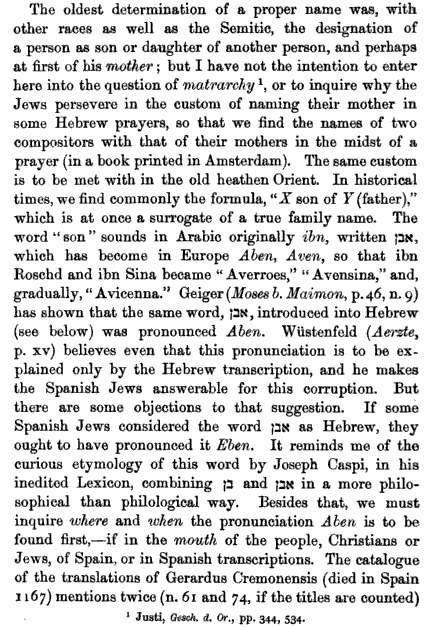
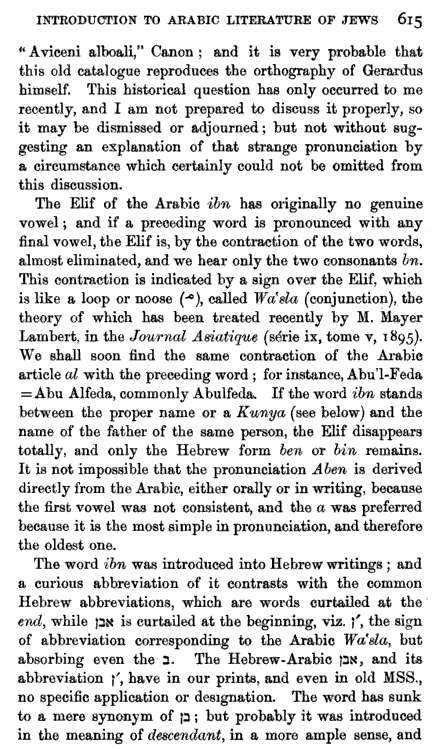

As we can see, he is less certain that the author of the Encylopedia entry who asserts that it is how Spanish Arabs pronounced it. Still, this brings us back to Levita, who was close in time and place to Spanish Jews, and presumably he knew how they pronounced it. However it should be noted that he doesn't explicitly make this claim. Rather, the example he gives is the pronunciation of the names of Arab scholars, like Avicenna. However, we know this is how European scholars pronounced it. Do we (and he) know that this was how the Arabs, in Spain at least, pronounced it? Nevertheless, he must be given weight since, as I said, he was familiar with Spanish Jews. In fact, he was already an adult by the time of the expulsion of 1492.
Finally, writing in 1873 Michael Friedlander gives this note:
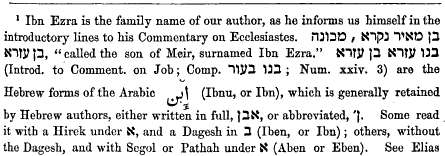
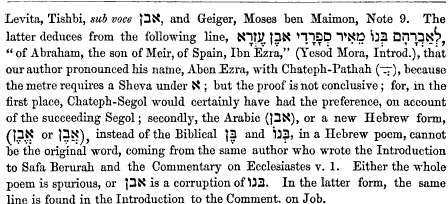
In conclusion, the upshot seems to be that "ibn" is an anachronism. Not necessarily wrong in the same sense that calling the subject of our post "Abraham" is wrong; that's merely a translation of his name into English. In all likelihood Aben or something close was how Spanish Jews with אבן or ן'י as part of their full name pronounced it. Thus "Aben Ezra" is fully justified.

The Eight Chapters of Maimonides as printed in the Vilna Shas is accompanied by the commentary Hesed Avraham. At the beginning of the text is the name of the translator, ibn Tibbon, and Hesed Avraham offers a comment on the strange word, Alef, Beth, Nun: "Even", a rock, is something strong and hard, and grammarians and others added it to their name to indicate their importance!
ReplyDeleteInteresting. The "traditional" Ashkenazic pronunciation that was current in my childhood, and to some extent now (I write that because one hears "ibn" these days from yeshivish circles in greater number than one used to) is "eben," or "even," which some presumably say to be more "correct" Hebrew.
ReplyDeleteActually I wonder how Moroccan and other North African Jews pronounce it, given their close proximity to Spain. Was it Aben or Ibn (the latter possibly influenced by Arabic or later development anyway)?
Slightly OT: for some reason the tradition way to write ibn (or aben, as the case may be) seems to have been with an "ende nun" and an apostrophe. No idea why, but you see it in all sorts of old seforim. Leads to ocasional confusion, e.g. in people not realizing that the "Maharin Lev" was actually the "Mahari Ibn Lev".
ReplyDeleteAlso a lot of times the ibns were translated back to "ben". So that the Rashba is written as "R' Shlomo ben Aderes" when his actual name was "R' Shlomo (ben Avrohom) ibn Aderes". (Also the afformention Mahari ibn Lev is frequently referred to as "Maharibal" for Mahari ben Lev.)
That's mentioned in the post. The Tishby brings it.
ReplyDeleteYou're right; Ibn Ezra is often called ראב"ע or even רבי אברהם בן עזרא. The truth is, בן can also properly be used to refer to a grandparent or other ancestor. For example, the famous Masorete Ben Asher, also known as Aharon ben Asher, was really Aharon ben Moshe ben Asher.
Actually it's interesting how the "mesorah" for all sorts of literary practices like these seems lost now, while they were well known not that long ago. Who in the 19th century (it seems to me) didn't know what the N' meant? Same goes for many abbreviations which people puzzle over now.
This was always my favorite "ibn":
ReplyDeletehttp://he.wikipedia.org/wiki/%D7%99%D7%94%D7%95%D7%93%D7%94_%D7%90%D7%91%D7%9F_%D7%91%D7%9C%D7%A2%D7%9D
Kind of takes the bite out of any "not a good Jewish name" argument, no?
Sorry, that link didn't post well. Try this:
ReplyDeletehttp://tinyurl.com/y95yjgb
I'm Moroccan, and all I can say is that the difference between ibn and abn is so insignificant in Arabic pronounciation it's almost not woth discussing. It's fine As long as you don't think it's "even". It's sort of like the name A'bd-'llah, which would work fine as "Abdulah" if only they didn't stress the u).
ReplyDeleteIn regards to רבי, it's certainly not Rebbi or Rebbe, that's just absurd. Moroccans say R'bi' or Ribi', but "Rabi" to me is very new.
Dave, that name is pronounced Bal‘am, not like the Biblical Bil‘åm. I think it's an Arabic name.
ReplyDeleteThere is a crater on the moon known as Abenezra. As far as I have been able to discover, it was named (along with all the other craters and "seas") by the Jesuit astronomer Giovanni Battista Riccioli in his book Almagestum Novum, 1651. He is said to have named the craters after various "philosophers and astronomers."
ReplyDeleteRegarding the suggestion: "it seems possible that some Jews understood אבן, at least with respect to Ibn Ezra, as an abbreviation for 'Avraham ben':
ReplyDeleteFrom the examples provided it seems you have inferred this from the fact that the word aben/ibn was written with gershayim as in the example "der ib"n Ezre oych zogt", it's more likely that this is simply an example of the widespread practice in Hebrew texts to mark non-Hebrew words in this fashion; look for instance at how Yiddish and other non-Hebrew words are spelled in printed editions of the posekim, and how the French words in Rashi are often printed: with gershayim, to show that they're foreign words. No abbreviation -- neither Avraham ben' nor anything else -- is intended.
Baruch Schwartz
S. "The truth is, בן can also properly be used to refer to a grandparent or other ancestor."
ReplyDeleteI don't think that's what it is. I think it was just a last name.
A guy whose name is Mendelson is not the son of someone named Mendel. Nor does the word "son" mean ancestor. At one point someone adopted the name Mendelson (presumably because his father was named Mendel) and the family carried that name forward thereafter.
The Ramban (possibly in Parshas Pinchos, IIRC) cites the ibn names as examples of families carrying on names in Chumash.
Goodbye, Ruvi Tuesday?
ReplyDeleteFred, are you sure the Yiddish work from 1894 is actually Yiddish and not German in the Mendelssohn-Heidenheim-Baer-et al. style? It seems to me to use איין where Yiddish would use אַ. Even more convincing (for me) is the segol in ערקלאֶרוג. In this Haskalah Judeo-German (and if someone knows the real name of this orthography, please let me know), אֶ is used for both ä and ö, and Erklärung is German for explanation.
ReplyDeleteYikes, I left out a nun in the previous comment. The last word in the sentence that begins with "Even more" (stone of a teacher?) should be ayin/resh/kof/lamed/segol alef/resh/vav/NUN/gimmel. Sorry.
ReplyDeleteIbn is בן, son in Arabic. Jews in Muslim cultures such as Islamic Spain sometimes were called by the Arabic version's name. So Ibn Ezra for example means "Son of Ezra" and it sounds as: Iben Ezra, in Arabic although it is written without the "e".
ReplyDeleteHi Abe.
ReplyDeleteThe point of this post was to (hopefully) demonstrate that in the dialect of Arabic spoken in Spain in the medieval period the Arabic ibn was actually pronounced more like abn, and this is the explanation for why scholars such as Ibn Ezra were called Aben Ezra (or Ibn Sina = Avecenna, etc.).
Hi S.
ReplyDeleteI think that "Aben" was first written by non Arabic speaking scholars. We can find other Arabic words that are written vocally differently in English, some time by the help of Medieval Greek and Latin. You brought Ibn Sina (Aben Sina) as example. Although it is written Aben in Latin, it is pronounced in Arabic as Iben and not Aben (I would say in humor that pronouncing it as 'Aben' sound a little bit as Idish, which means that it is a great mistake of medieval translators). You might see how “Iben” is written in Jordan for example: Iben-Khaldoon st. http://www.denian.net . In Hebrew it is written as sounds: אִיבֶּן and in Arabic: إبن (Iben or Eaben) and it sounds as heavy and continues 'ea', as sounds in 'ear', for example. Abn, as 'Abn'al Israeel' (Sons of Israel) for example , is in for plural.
I understand, but there's no such thing as a single Arabic pronunciation then there is a Hebrew or an English one. Arabic has many variations in dialect; ibn/ bn, or Mecca/ Macca.
ReplyDeleteFurthermore, Spanish Jews themselves wrote their names as "Aben" (and not just famous names, like Aben Ezra or Avecenna and the like). In addition, Elijah Levita, who lived in Italy before, during and after the expulsion period, pointed it to read "Aben" in Hebrew. Levita was a careful, exacting scholar, and there is no reason why he was following the mistaken European scholars. On the contrary, in all matters Hebraic he was their guide, not the reverse.
Finally, although not an authoritative source, the Encyclopedia of Islam I called attention to at the outset of this post also concluded that "Abn" was the Spanish pronunciation of Ibn. Therefore I conclude that the weight of evidence suggests that "Aben" was not a Latin mistake anymore than "Bin" is regional Arabian mistake.
As stated by S., It was common in Iberia to say and spell ABEN or just BEN:
ReplyDeleteAben Ezra, Abendana, Abenamor, Abensur, Abenamiel, Abendaoud, Bensaúde, Benamor, Benakri, Bentrigo, Benassuli and so forth.
Probably from the way it was pronounced in Mozarabic (Mozárabe) dialect.
Luciano de Lopes s"t
Maybe this whole "a" or "i" discussion could be resolved if the "a" had actually been pronounced more like "ä" -- a vowel that falls somewhere between "a" and "i'. In this case, there would be very little difference between "ibn" and "äben".
ReplyDeleteRegarding the tsere vs. segol, I presume he views the word as grammatically parallel to the Hebrew בן. When appearing on its own (i.e. the head of the entry) it takes a tsere, but as part of a hyphenated phrase (i.e. someone's name) it changes to a segol.
ReplyDeleteWhat's up mates, its enormous article regarding tutoringand completely defined, keep it up all the time.
ReplyDeleteHere is my webpage wiki.musicontology.com